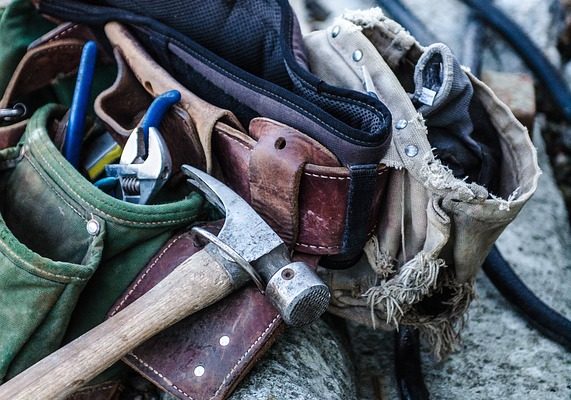Most people have a running to-do list for their homes, from planting new flowers to updating their kitchen and everything in between. Before you try to master the skills of cutting tile with a wet saw, there are some basic DIY skills you should add to your repertoire no matter what your DIY wish list looks like. Once you have these skills under your belt, you can work on adding more specific skills, such as using a wet saw.
Wall Stuff
Finding a stud is simple when you have a stud finder, but you don’t need a tool to do the job. Studs are vertical beams that support walls that are utilized when mounting decorations or TV screens or anchoring heavy furniture to walls. You can easily find them if you know where they’re typically placed. There should be a stud on either side of each window in your home, as well as beside electrical boxes for switches and outlets. You can also look for nails that have been hammered into the molding, as these are usually driven into the stud. Once you find one, you can measure the remaining studs, since they tend to be set every 16 or 24 inches around the room. To check, tap the wall – spots that have a hollow sound are just drywall, but a stud will sound noticeably denser.
You should also learn to use anchor screws to hang heavy objects. Anchoring a bookcase to a wall is less about looks and more about safety (and it uses your new stud finding skills!). Your approach will vary depending on whether your bookcase is backless or not. Once you’ve mastered adding stuff to walls, you should learn how to patch walls. Removing or relocating items on walls leaves unappealing holes and bumps behind. With a little spackle, a putty knife, and some paint, you can quickly fix the walls. Learning to paint like a professional should also be on your list of skills to learn.
Bathroom Matters
The bathroom is one of the most used rooms in your home, so you’ll want to know how to fix a few common issues, such as a loose tile. You should also learn how to unclog and snake a drain, fix a leaky faucet, and change a showerhead. Many people call a plumber for these easy repairs and waste a lot of money.
Fixing tile while it’s loose lessens the chances of it escalating into a broken tile. After loosening the adhesive with a preheated iron, gently lift the tile out and clean the area underneath with alcohol. Scrape the area with a putty knife to remove the remnants of the old adhesive. Apply a new coat of adhesive to the gap and back of the tile, and carefully replace the tile. Press the tile into place and remove air bubbles using a rolling pin. Lastly, wipe away any excess adhesive on or around the tile, and weigh down floor tiles with a heavy object until the bond sets.
Doors, Windows, and Beyond
A few other important and easy-to-master DIY skills include tightening a loose door hinge, changing a door knob, replacing a screen window, stopping a running toilet, changing a light switch, sealing a pavement crack, changing a furnace filter, and cleaning the gutters. Some of these fixes are purely cosmetic, while others (like sealing a pavement crack) prevent small concerns from turning into big problems.
Of course, unless you’re highly experienced, some projects should be left to the professionals, including serious electrical work, deep plumbing, anything to do with a septic tank, and a few others. For jobs that require you to empty a room, such as replacing drywall or sanding floors, you may want to hire someone to help you move items into storage. Even if you can handle the project alone, lifting and carrying heavy furniture alone poses a safety risk.
Learning to tackle small issues around the house, such as a clogged drain, can save you money. There’s also a sense of self-assurance and ownership of your home that comes along with fixing things and handling other projects like upgrading your bathroom. The more you handle on your own, the more your skills will improve, and the bigger your projects can grow. Be sure to check out these DIY safety tips when tackling home projects yourself.


